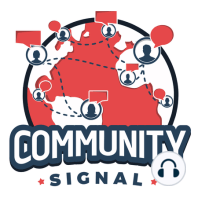36 min listen

How Telehealth Provides More Efficient Healthcare for Patients and Providers – and the Role Online Communities Can Play
FromCommunity Signal
How Telehealth Provides More Efficient Healthcare for Patients and Providers – and the Role Online Communities Can Play
FromCommunity Signal
ratings:
Length:
42 minutes
Released:
Sep 20, 2021
Format:
Podcast episode
Description
How did the pandemic impact your relationships with your healthcare providers? Did telehealth enable you to continue seeing or connecting with your providers to receive the care that you needed? In this episode of Community Signal, Denzil Coleman, a telehealth coordinator, developing and maintaining digital health interventions at the Medical University of South Carolina (MUSC) Center for Telehealth, discusses how the adoption of telehealth interactions and practices during the pandemic may lead to continued and more long-term improvements and efficiencies in our healthcare system. Denzil explains that telehealth is “anything where healthcare is being impacted by a patient and an actor that are not in the same location. That includes a video, that includes transmissions of information, asynchronous messaging, [and] remote patient monitoring.” Telehealth can create efficiencies for both patients and providers –– giving patients flexibility to see their providers without the burden of travel and with the option to invite more caregivers into these interactions. Whereas in the past, patients may have received pamphlets with details about in-person support groups or other care options, today there are online communities and support groups and insurance companies themselves even offer telehealth options. With these options come more opportunities for patients to be more engaged in the care that they receive and for providers to thoughtfully care for patients. Denzil and Patrick also discuss how: COVID, the shifting landscape of the healthcare profession, and the fact that folks are living longer, healthier lives all impacts the healthcare system The flexibility of telehealth allows a patient’s support system to become more involved in their care Creating efficiencies in the healthcare system should not equate to patients receiving less care Value-based care could resemble a community-like investment in overall care Our Podcast is Made Possible By… If you enjoy our show, please know that it’s only possible with the generous support of our sponsor: Vanilla, a one-stop shop for online community. Big Quotes What exactly is telehealth? (2:01): “To put it simply, telehealth is … anything where healthcare is being impacted by a patient and an actor that are not in the same location. That includes a video, that includes transmissions of information, asynchronous messaging, [and] remote patient monitoring.” –@denzilcoleman How the pandemic is leading to wider adoption of teleheath interactions (4:55): “Even at the Center for Telehealth at MUSC, where I work, we saw a very significant uptick in telehealth interactions of all kinds since the start of the pandemic, just because pretty much every interaction had to take place that way for patient safety. The forced adoption of the time of the emergency is really what prompted it, but we’ll take it because as people are getting more comfortable with these modalities, we’re able to push digital health forward a lot quicker.” –@denzilcoleman Online communities can help keep patients engaged in their own care (8:10): “A lot of times, you may give an intervention or a plan of care in which the patient is not fully engaged. Having them as part of one of these [online] communities where they feel supported, encouraged to take part and advocate for their own care, and share experiences, it keeps them engaged. It keeps their focus on their health and on getting better.” –@denzilcoleman Healthcare optimization could lead to online communities (22:51): “[Healthcare optimization means] expanding the reach of what we already do, expanding the reach of providers who are overwhelmed, overworked, and facing a mushrooming population of people who are living longer, healthier lives. Which is great, but at the same time, we are having less and less people graduate from medical school becoming doctors. Of course, those are being supplemented by what we refer to as mid-level providers and a large increase
Released:
Sep 20, 2021
Format:
Podcast episode
Titles in the series (100)
The State of Online Community as a Career: Consider this episode of Community Signal your community career advisor on speed dial. by Community Signal